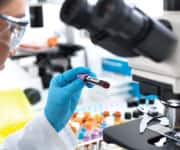Life Extension Magazine®

Science has made remarkable strides in the fight against cancer.
But too often, treatments still fail. Cancer remains the second most common cause of death in the U.S., after heart disease.
A new approach called personalized precision immunotherapy offers fresh hope to cancer patients who seem to have run out of options.
In the case of one leukemia patient who had failed chemotherapy and a bone marrow transplant, and was given less than a year to live, a cutting-edge treatment increased the activity of his own immune system more than nine-fold.
This helped his body destroy the cancer and restore his immune system, leading to a recovery so dramatic, he recently completed his first triathlon.
Three years after he began treatment, his cancer remains in complete remission.
A Diagnosis and Failed Treatment

It was 2015. Richard (the patient’s name has been changed to protect his privacy) was 37 years old, with no history of health problems, when he began feeling fatigue, lethargy, an ache in his back, and pain in his leg and ribs.1
Pain medication didn’t help, and after two weeks, doctors performed a series of tests, including a complete blood count and a follow-up bone marrow biopsy. The results confirmed his worst fear: He had an aggressive form of acute lymphoblastic leukemia, a cancer of the blood and bone marrow.
The news got worse. Those cancer cells all carried the Philadelphia chromosome, an abnormality that makes treatment more difficult, relapse more likely, and prognoses poorer.1,2
At the previous clinic, before coming to the Maharaj Institute of Immune Regenerative Medicine, Richard embarked on a complicated five-drug chemotherapy regimen, primarily consisting of medications that stop wildly reproducing cells—but that also shut down many vital natural processes in the body, leading to severe side effects.1
Richard also received one of a new generation of cancer drugs, imatinib, which succeeded in suppressing the activity of the Philadelphia chromosome.
He then underwent another round of high-dose chemotherapy, along with total body irradiation to destroy all vestiges of his cancer cells.
That was followed by a bone marrow transplant from his brother. The goal was to repopulate Richard’s cancer-ridden bone marrow with healthy donor stem cells from his brother, including donor immune cells that could directly attack the leukemia.
As often happens, Richard developed graft-versus-host disease, in which the immune cells from his brother turned on Richard’s own tissues, attacking them and threatening his life.1
To manage the graft-versus-host disease, Richard received several drugs including steroids, chemotherapy such as methotrexate, and severe immune-suppressing drugs such as cyclosporine, in the hope that they’d control the donor marrow cells and stop their attacks on Richard’s body. Fortunately, this approach worked—for a time.
But soon, a relapse occurred, with renewed activity of the Philadelphia chromosome evident. He then received an infusion of his brother’s lymphocytes (immune cells made in the bone marrow). It seemed to work, putting him into a second remission, but a second relapse occurred a few months later.
At 39, Richard was told he had less than a year to live.1
Remarkable Recovery

But Richard’s luck was about to change.
In March of 2017, he found his way to the Maharaj Institute of Immune Regenerative Medicine in Boynton Beach, FL, to discuss his few remaining options.1
Richard chose to go forward with an experimental treatment: personalized, low-dose immunotherapy.
Immunotherapy is a type of treatment that boosts the body’s own, natural immune system, helping it fight disease.
Treatment began with daily low-dose injections of interleukin-2 (IL-2), a naturally occurring human signaling protein. Its normal function in the body is to regulate immune system cells, providing them with explicit instructions.
The goal of treatment was to selectively stimulate the transplanted immune cells to attack the leukemia—and to stop their assaults on Richard’s own tissue.1
What made the therapy personalized was that Richard’s blood was monitored daily to see how the treatment was working. The doses and duration of each cycle of IL-2 injections were precisely determined by the results.
Richard rapidly improved. Over the course of four cycles of treatment, there was an astonishing nine-fold increase in the activity of his own natural killer cells, immune cells containing enzymes that kill tumors.1
Levels of another signaling protein, interferon-gamma, which boosts the immune system, also rose dramatically and remained high throughout treatment.
At the end of the 23-week course of immunotherapy, the total proportion of Richard’s own cells that were fighting his cancer increased from just 7.1% to 63.4%.
At the same time, regulatory T-cells, which suppress immune response, declined significantly. These cells had been holding back Richard’s immune cells from their full potential.
By the end of his treatment, Richard’s blood showed no evidence of Philadelphia chromosome activity—and no leukemia cells in his marrow. Side effects of his treatment were limited to momentary, low-grade redness at the injection site.
Now, roughly three years after starting this personalized immunotherapy journey, Richard remains healthy, shows no symptoms, and has a normal quality of life.
In fact, the recovery has been so remarkable, he recently completed his first triathlon.
How Personalized Immunotherapy Works
Traditional chemotherapy or radiation treatments aim to wipe out cancer cells, but they kill so many healthy cells at the same time that they do severe damage to a patient.
And when treatment stops, the cancer too often comes back.
Even bone marrow transplants, that are sometimes part of the treatment of leukemia, lymphoma, and similar cancer, and which replace diseased blood-forming cells with fresh, healthy ones, can fail or lead to graft-versus-host disease.
Personalized precision immunotherapy takes a new approach. Administering recombinant (genetically engineered) IL-2 stimulates our own natural killer cells to attack tumors.1,3
It also works to maintain the crucial condition of immune tolerance. That’s what keeps our immune systems from working against us, and it is what breaks down when patients develop graft-versus-host disease.1,4-7
In Richard’s case, IL-2 achieved both goals. It raised levels of tumor-killing natural killer cells and suppressed levels of cells trying to attack his healthy tissues. IL-2 also boosted levels of interferon gamma, which promotes the natural killer cells’ abilities.1,8,9
One size does not fit all with this kind of treatment. Doctors created a personalized approach, selecting just the right compound (IL-2), administering it in carefully monitored amounts, and altering the dose in response to daily blood testing.
They achieved a nearly unheard-of result: complete remission of an aggressive cancer, with minimal side effects and no evidence of new graft-versus-host disease.
Researchers believe this type of treatment holds great promise in treating patients with many different forms of cancer.
It is important to understand that IL-2 became available as a cancer drug decades ago, in 1992, and initially there was great hope that it might effectively treat most malignancies.
However, the high-doses of IL-2 used in those early days yielded only marginal benefits against patients’ cancers but inflicted serious side effects. Dr. Maharaj’s approach uses personalized IL-2 dosing about 10% as potent as when IL-2 is administered as frontline treatment. This lower dose yields marked improvements in immune function without serious side effects.
Summary
Many forms of cancer are still resistant to aggressive treatments like chemotherapy.
Adults with recurrent acute lymphoblastic leukemia, for example, have a dismal prognosis, with long-term survival measured in months.
But there’s a new hope: personalized precision immunotherapy.
Using this treatment on a patient who had been given less than a year to live, doctors administered a potent signaling molecule, IL-2, to stimulate the immune system. The dose was adjusted in response to daily blood testing.
After 23 weeks of treatment with almost no side effects, his cancer is effectively gone. He remains healthy and cancer-free three years later.
Personalized immunotherapy holds tremendous promise for treating deadly leukemias and may be of value for other cancers in the future.
If you have any questions on the scientific content of this article, please call a Life Extension® Wellness Specialist at 1-866-864-3027.
For more information on personalized precision immunotherapy, please contact the Maharaj Institute of Immune Regenerative Medicine at 561-752-5522 or info@miirm.org.
Dipnarine Maharaj, MD, FACP, has over 30 years of experience as an internist, hematologist, oncologist, and bone marrow/stem cell transplant physician. He is the Founder and Director of the South Florida Bone Marrow Stem Cell Transplant Institute DBA Maharaj Institute of Immune Regenerative Medicine in Boynton Beach, Florida. Dr. Maharaj is on the Scientific Advisory Board of Life Extension®.
References
- Maharaj D, Vianna P, DeCarvalho G, et al. Molecular remission using low-dose immunotherapy for relapsed refractory Philadelphia chromosome-positive precursor B-cell acute lymphoblastic leukemia post-allogeneic stem cell transplant. Future Sci OA. 2019 Jun;5(5):FSO380.
- Pui CH, Roberts KG, Yang JJ, et al. Philadelphia Chromosome-like Acute Lymphoblastic Leukemia. Clin Lymphoma Myeloma Leuk. 2017 Aug;17(8):464-70.
- Klemann C, Wagner L, Stephan M, et al. Cut to the chase: a review of CD26/dipeptidyl peptidase-4’s (DPP4) entanglement in the immune system. Clin Exp Immunol. 2016 Jul;185(1):1-21.
- Ackerstein A, Kedar E, Slavin S. Use of recombinant human interleukin-2 in conjunction with syngeneic bone marrow transplantation in mice as a model for control of minimal residual disease in malignant hematologic disorders. Blood. 1991 Sep 1;78(5):1212-5.
- Slavin S, Naparstek E, Nagler A, et al. Allogeneic cell therapy with donor peripheral blood cells and recombinant human interleukin-2 to treat leukemia relapse after allogeneic bone marrow transplantation. Blood. 1996 Mar 15;87(6):2195-204.
- Malek TR, Bayer AL. Tolerance, not immunity, crucially depends on IL-2. Nat Rev Immunol. 2004 Sep;4(9):665-74.
- Nelson BH. IL-2, regulatory T cells, and tolerance. J Immunol. 2004 Apr 1;172(7):3983-8.
- Wang R, Jaw JJ, Stutzman NC, et al. Natural killer cell-produced IFN-gamma and TNF-alpha induce target cell cytolysis through up-regulation of ICAM-1. J Leukoc Biol. 2012 Feb;91(2):299-309.
- Strasser A, Jost PJ, Nagata S. The many roles of FAS receptor signaling in the immune system. Immunity. 2009 Feb 20;30(2):180-92.

